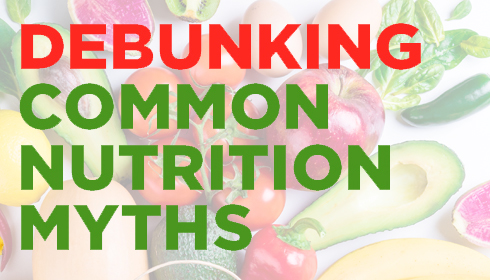
Debunking 7 common nutrition myths
In the constantly changing realm of nutrition, it's essential to stay updated to make wise dietary decisions. This detailed guide seeks to debunk prevalent misconceptions about current nutrition fads, offering evidence-backed perspectives to assist you in navigating the often perplexing realm of dietary practices. By grasping the misconceptions and truths, you can make educated choices regarding your nutrition, promoting a healthier and more harmonious way of life.
Myth #1: Everyone Can Benefit from Adopting a Gluten-Free Diet for Better Health.
Gluten-free diets hold particular importance. While commonly believed to be universally healthier, they are crucial for those with gluten sensitivity or celiac disease. However, for individuals without these conditions, cutting out gluten could result in nutritional gaps. Wheat, barley, and rye, grains containing gluten, are valuable sources of essential nutrients. Opting for a gluten-free diet without medical need may unintentionally reduce your consumption of vital vitamins and minerals.
Myth #2: Not all fats are unhealthy.
Certainly! "Not all fats are unhealthy; it's important to differentiate between healthy and unhealthy fats. While saturated and trans fats should be limited, unsaturated fats are beneficial for heart health and overall wellness. Foods like avocados, nuts, and olive oil contain essential fatty acids that support bodily functions. Understanding this difference is crucial for maintaining a balanced and nutritious diet."
Myth #3: Detox diets purify your body from toxins.
Our bodies naturally undergo detoxification through processes orchestrated internally. While detox diets promise to rid the body of toxins, it's important to note that our body already has highly effective detox systems, mainly managed by the liver and kidneys. Many marketed detox plans lack scientific backing and could pose risks. Opting for a balanced, nutrient-dense diet nurtures the body's inherent detox mechanisms, rendering extreme detox diets unnecessary and possibly detrimental.
Myth #4: Weight Loss Requires Carbohydrate Avoidance.
The body requires a moderate intake of healthy carbohydrates. Contrary to a common misconception in weight loss discussions advocating for the avoidance of all carbs, carbohydrates play a crucial role as an energy source. Opting for complex carbohydrates present in whole grains, fruits, and vegetables not only supplies essential nutrients but also dietary fiber. Embracing moderation and selecting nutritious carbohydrate sources instead of entirely shunning them forms the cornerstone of a sustainable and well-rounded approach to weight control.
Myth #5: Weight gain is caused by eating late at night.
The notion that late-night eating invariably causes weight gain overlooks the intricacies of managing weight. Weight gain hinges more on the overall balance of calories consumed and expended throughout the day. The type and quantity of food you consume, along with your general activity level, have a greater impact on weight management than the precise timing of calorie intake.
Myth #6: High-protein diets damage kidney function.
A common misconception cautions against high-protein diets, implying potential harm to kidney health. Contrary to this belief, high-protein diets typically pose no significant risks for individuals in good health. Nevertheless, those with pre-existing kidney conditions should be mindful of their protein intake. Seeking guidance from a healthcare provider is crucial to tailoring dietary recommendations to individual health requirements.
Myth #7: Not all sugar alternatives are necessarily healthy.
Moderation remains essential when it comes to artificial sweeteners. Oversimplifying the idea that all sugar alternatives are beneficial ignores the intricate array of sweeteners available. While incorporating some sugar substitutes into a balanced diet can be acceptable, overindulging in particular artificial sweeteners could lead to adverse health consequences. Therefore, it's vital to exercise moderation. Exploring natural sweeteners such as honey or maple syrup may be a preferable option for individuals aiming to reduce their consumption of artificial additives.
Thus, as we can see from the above discussion, grasping the realities behind prevailing trends enables people to embrace balanced and sustainable nutrition habits. Seeking advice from registered dietitians or healthcare experts can offer tailored recommendations, ensuring your dietary decisions suit your specific health objectives. By staying knowledgeable and embracing nutrition rooted in evidence, you can confidently navigate the intricate realm of dieting, fostering optimal health and wellness.